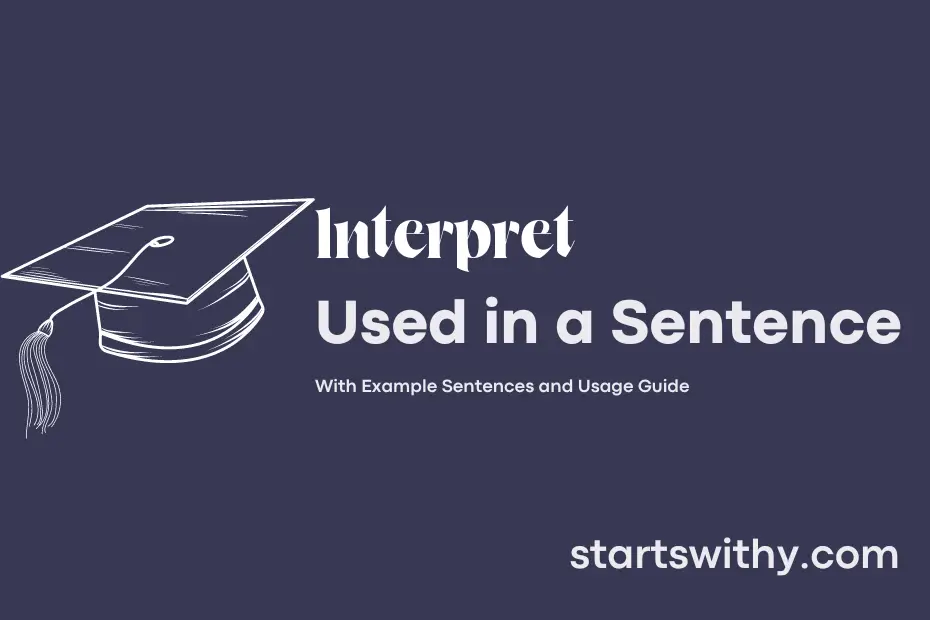Ever found yourself grappling with the meaning of specific words or texts? If so, interpreting them correctly is key. To interpret means to explain or understand the meaning of something, whether it’s a piece of writing, a gesture, or a situation.
Interpreting involves analyzing and making sense of information to form a clear understanding. It plays a crucial role in communication, literature, law, and various other fields. Let’s explore how interpreting works and its significance in various contexts.
7 Examples Of Interpret Used In a Sentence For Kids
- Interpret means to understand something in your own way.
- Can you interpret what the story is about?
- Use your imagination to interpret the picture in your own way.
- It’s okay if we all interpret things differently.
- Let’s work together to interpret this poem.
- How do you interpret the ending of the movie?
- Remember, everyone can interpret things differently.
14 Sentences with Interpret Examples
- Interpret the results of the experiment to draw meaningful conclusions.
- Make sure to interpret the data accurately before submitting your research paper.
- It is important to properly interpret the instructions before starting the assignment.
- Interpret the poem according to the cultural context in which it was written.
- Can you interpret the significance of these historical events in the context of your course?
- Students often struggle to interpret complex mathematical equations without proper guidance.
- Remember to interpret the graphs and charts in your textbook to better understand the concepts.
- Interpret the theory in your own words to solidify your understanding of the subject matter.
- It’s crucial to interpret academic articles critically to extract valuable information.
- Try to interpret the different perspectives presented in the debate to form your own opinion.
- Make sure to interpret the feedback from your professors constructively to improve your work.
- Interpret the cultural nuances in the literature you are studying to appreciate its depth.
- Collaborate with your peers to interpret the difficult concepts discussed in class.
- Use a variety of sources to interpret the historical events from multiple viewpoints.
How To Use Interpret in Sentences?
Interpret is a versatile word that can be used in various contexts in a sentence. When using interpret, it is essential to understand its meaning, which is to explain the meaning of something or to understand someone’s words or actions in a particular way.
Here is a simple guide on how to use interpret in a sentence:
-
Interpret when you want to explain the meaning of something:
- She tried to interpret the painting by analyzing the colors and shapes used by the artist.
-
Interpret when you want to understand someone’s words or actions:
- It is important to interpret body language to gauge someone’s true feelings.
-
Interpret when you want to translate from one language to another:
- The translator had to interpret the speaker’s words from French to English.
-
Interpret in a legal context to explain the law or rules:
- The lawyer will interpret the contract to determine its implications.
Remember, when using interpret in a sentence, make sure it fits the context you are trying to convey so that your message is clear. Practice using interpret in different ways to become more comfortable incorporating it into your writing or conversations.
Conclusion
In conclusion, the ability to accurately interpret information is crucial in many aspects of our lives. Whether it is understanding complex data, making sense of ambiguous statements, or translating languages, our skills in interpretation can greatly impact our decision-making and communication. For instance, incorrect interpretations of laws can lead to misunderstandings and legal issues, while misinterpreting scientific research can result in misguided conclusions.
Developing a keen sense of interpretation requires critical thinking, attention to detail, and a willingness to consider different perspectives. By honing this skill, we can enhance our comprehension of the world around us, foster better relationships through effective communication, and make informed choices based on a clear understanding of the information presented to us. As we navigate through a sea of data and opinions, mastering the art of interpretation can empower us to navigate complexities with confidence and clarity.



